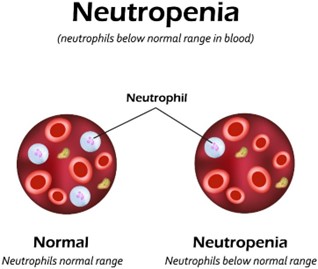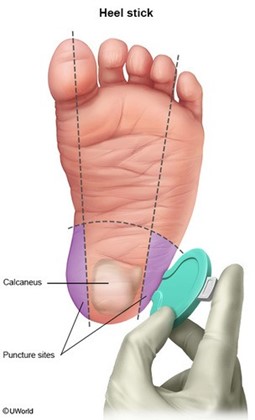A nurse is reinforcing discharge teaching with the guardian of a client who is neutropenic. Which of the following instructions should the nurse include?
"You can take your child to stores on weekends."
"You should inspect your child's mouth weekly for ulcers."
"You should notify your provider if your child has a fever."
"You can give your child fresh fruit for snacks."
The Correct Answer is C
A nurse reinforcing discharge teaching with the guardian of a client who is neutropenic should include the instruction to notify the provider if the child has a fever. A fever can be a sign of infection, which can be serious in a client who is neutropenic.
The other options are not correct.
A client who is neutropenic should avoid crowded places such as stores to reduce their risk of infection. The guardian should inspect the child's mouth daily, not weekly, for ulcers. A client who is neutropenic should avoid fresh fruits as they may carry bacteria that can cause infection.

Nursing Test Bank
Naxlex Comprehensive Predictor Exams
Related Questions
Correct Answer is C
Explanation
The nurse should apply a heat pack 5 to 10 minutes prior to the procedure when planning to obtain blood from a newborn via a heel stick. This helps to increase blood flow to the area and makes it easier to obtain the specimen.
a) Puncturing the heel to a depth of 4 mm is too deep and can cause injury to the newborn. The recommended depth for a heel stick is 2.4 mm or less.
b) Withholding feeding prior to collecting the specimen is not necessary.
d) Elevating the newborn's foot for 15 minutes following the procedure is not necessary.

Correct Answer is B
Explanation
Explanation:
The nurse should respond by recommending that the parent avoids administering aspirin to the child. The use of aspirin in children, especially those under the age of 18, is associated with the risk of developing Reye's syndrome, a rare but serious condition that affects the liver and brain. It is important to educate parents about the potential risks of using aspirin in children, particularly when they have a fever. Instead, the nurse should advise the parent to use appropriate dosages of acetaminophen or ibuprofen based on the child's weight and follow the label directions for administration.
Option a suggests following the label directions based on the child's weight, which may not specifically address the use of aspirin in children and the risk of Reye's syndrome. Option c, stating that the child will require an antibiotic if she develops a fever, is incorrect because antibiotics are not indicated for all fevers and should only be prescribed if there is an underlying bacterial infection. Option d, suggesting that the child can have two baby aspirins every 4 hours, is incorrect and contradicts the recommendation to avoid administering aspirin to the child.
Whether you are a student looking to ace your exams or a practicing nurse seeking to enhance your expertise , our nursing education contents will empower you with the confidence and competence to make a difference in the lives of patients and become a respected leader in the healthcare field.
Visit Naxlex, invest in your future and unlock endless possibilities with our unparalleled nursing education contents today
Report Wrong Answer on the Current Question
Do you disagree with the answer? If yes, what is your expected answer? Explain.
Kindly be descriptive with the issue you are facing.
